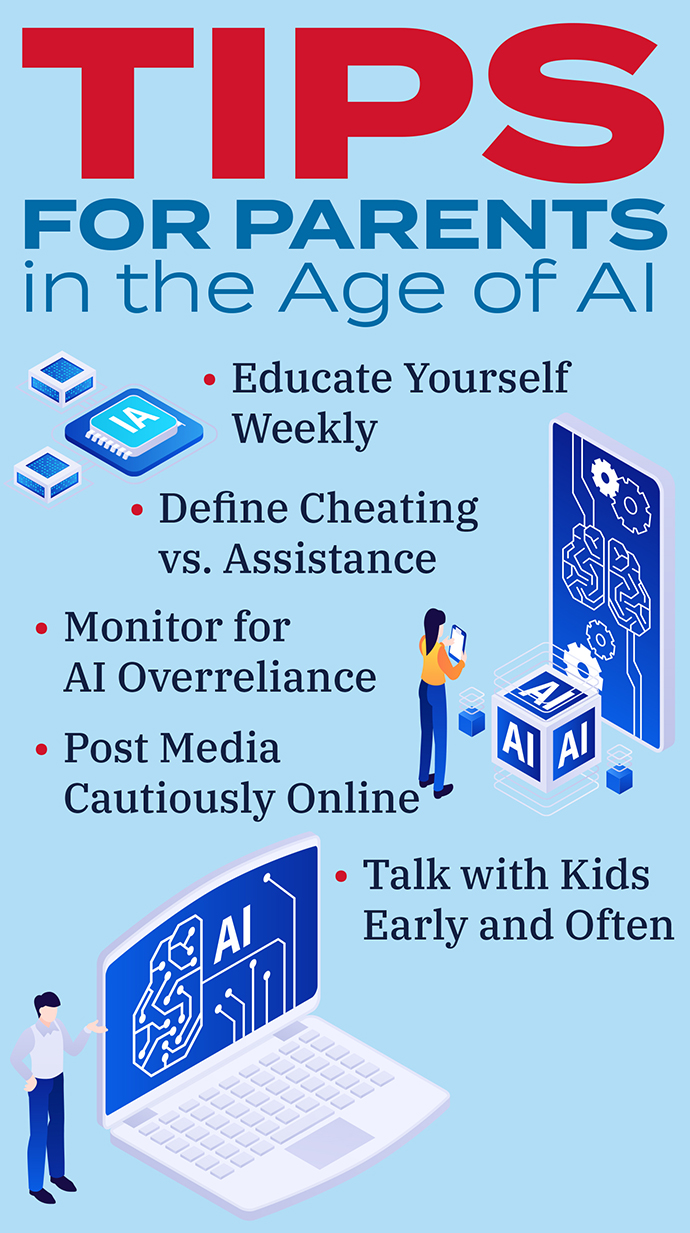News You Can Use: Parents Have Vital Role in Helping Kids Navigate AI
Ole Miss expert offers guidance for parents in raising artificial intelligence-aware kids

OXFORD, Miss. – Parenting has never been an easy job. In each generation, it comes with tough conversations on topics ranging from sex and peer pressure to politics and mortality. In the digital age, that list should continue to grow with family discussions about artificial intelligence, a University of Mississippi expert in AI literacy expert advises.
Marc Watkins, director of the Mississippi AI Institute for Teachers and assistant director of academic innovation, leads research into generative AI's impact on education. He is a lecturer in the Department of Writing and Rhetoric and often guides educators and Ole Miss students through the fast-moving – sometimes dangerous – world of AI.
He said parents need to learn some crucial lessons.

"The biggest challenge with generative AI is many parents didn't grow up using this technology, so it's difficult to share advice with their kids when they haven't had any experience with it," Watkins said.
"What we have to do first is get more parents comfortable talking about AI."
AI tools, including ChatGPT, Microsoft Copilot and Google Gemini, are already part of many teenage students' daily routines. Whether they're writing papers, studying or using AI-generated voices for emotional support, students use these tools more frequently and in more personal ways than many parents realize, he said.
"One of the fastest-growing uses for AI is therapy and companionship," Watkins said. "That's not really on a lot of parents' radar right now, but it should be because it represents new challenges.
"You're literally going to be talking with these bots using the new voice mode and that has some pretty profound risks associated with it."
He cautioned that generative AI is designed to mimic human emotion and provide instant feedback, which can become addictive for young users, especially if they're struggling socially or emotionally.
Overreliance on these tools also thwarts critical thinking development, and parents should watch for signs their children are replacing personal relationships with emotional connections with AI, Watkins said.
Watkins recommends a few strategies for guardians of children of all ages:
- Start AI conversations early: Though federal law and some generative AI sites require users to be 13 years old to sign up to use these tools, early discussion can help students think critically and better understand the technology's ethical uses for school, social media and social life.
- Seek weekly AI lessons: Spend about 30 minutes per week reading or exploring something related to AI, then talk about it as a family. Staying informed should not be overwhelming. The AI Ethics and Policy News site updates often and organizes AI news by topic.
- Ask how, not just if, your child uses AI: This approach opens healthy conversations about learning and responsibility. Parents may also discover safety concerns.
- Discuss cheating versus assistance: Help your family reflect on the delicate difference between using a chatbot as a study aid and simply copying its results. Discussions about the importance of learning ensure students digest lessons and are not ill-prepared later.
- Think twice before posting publicly online: Digitally altered videos, photos and audio clips – or deepfakes – are on the rise. Consider blurring kids' and teens' faces before posting.

Encouraging students to speak with their teachers or professors about their classroom AI guidelines is also advised.
Many colleges allow instructors to set their own rules for using AI tools, potentially adding confusion or anxiety about how to best tackle assignments, Watkins said.
Increasingly, students nationwide are concerned about being falsely accused of using AI. Some students began recording their hourslong writing process or saving keystroke logs as a result.
It's a troubling trend for Watkins but also one driving home the importance of parents playing their role in this breakneck-paced digital age. That starts with creating a home environment built on communication and support.
"We don't want students to feel like they're being surveilled," he said. "When that happens, they stop taking creative risks in their writing. That's not what education should be about.
"This isn't about keeping up with every new tool. It's about helping students build ethical habits and a strong sense of identity in a world where AI is part of everyday life."
Top: Artificial intelligence tools, including ChatGPT, Microsoft Copilot and Google Gemini, are already part of many teenage students' daily routines. AI literacy expert Marc Watkins says parents have a role to play in helping their kids understand the risks of usage and how to ethically use these tools as a learning resource. Photo illustration by John McCustion/University Marketing and Communications
By
Marvis Herring
Campus
Office, Department or Center
Published
June 19, 2025
